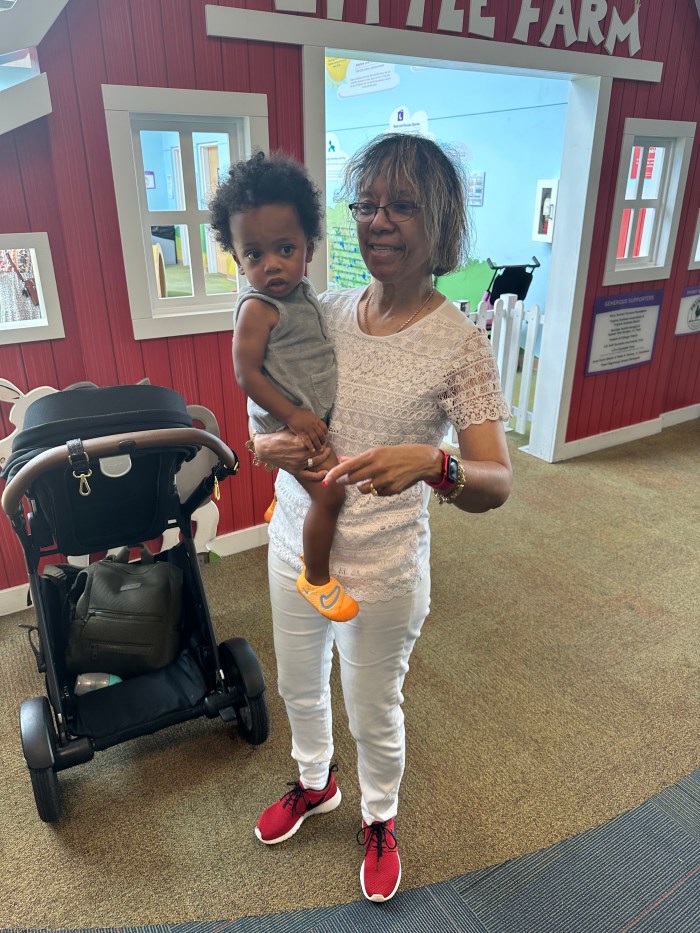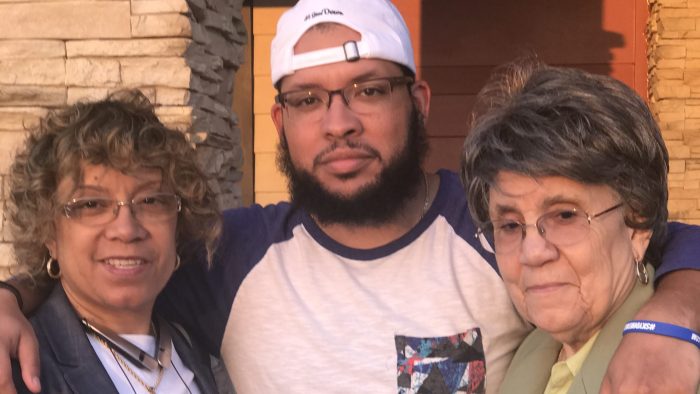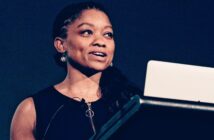On Sept. 13, appearing on ESPN’s Around The Horn was my “Rapsody moment.” Speaking about my mother, who has Alzheimer’s disease, on national television for the first time was cathartic. It was also directly inspired by the North Carolina MC and her song “Loose Rocks,” which tackles dementia, which Alzheimer’s is a form of.
Rapsody said that “[allowing]myself to be human” was a new, out-of-body experience on her deeply personal new album, Please Don’t Cry. Yet, the quiver in her voice on the song was all too familiar.
“Ok, I’ma call you more,” she told her aunt Dale, whom she refers to in the song as her “second mother.”
“I remember when I was me,” my mother told me last week. “I just don’t know how to be me.”
As we observe World Alzheimer’s Day, the emotions expressed in those two quotes are part of my life story.
In “Loose Rocks,” the Snow Hill, North Carolina native peels back the layers of Aunt Dale’s dementia diagnosis. “My reality is that I dread the day I walk into the house and you ask someone who I am,“ she raps. In the hundreds of conversations with my mother since her diagnosis, that is her biggest fear. She forgets many things these days but doesn’t forget what she’s most terrified of losing. The day will eventually come when she won’t recognize who I am. When she won’t remember everything we’ve been through as parent and child. But most importantly, when she no longer remembers the grandchildren and daughter-in-law she’s always prayed for. It’s hard to know what to say when those conversations arise, and, honestly, I’ve yet to figure it out. I don’t know if I ever will, because how do you tell the person responsible for your life that the sheer essence of who they are won’t become a memory of the past? They’ll never know it existed.
“Loose Rocks” isn’t an exact replica of my life. Yet, the anger, sadness and fear expressed in the song are just as palpable. At some point over the last two years, becoming a parent, in essence, to my mother, has become an inescapable norm. Paying bills, setting up doctor’s appointments, filing taxes, talking to lawyers to organize wills — it’s hard to imagine all that becoming a part of life. Still, it’s even more difficult to imagine life without it.
The reality one day, to you, I’ll be a stranger
Life ain’t easy wit’ these changes
Mentally, I’m barely hangin’ but get up again
It’s crazy what a hug would do for you and them
Diagnosed with Alzheimer’s days before Christmas last year, she began showing symptoms at least two years earlier. The consensus I’ve gotten from countless people who contacted me after the Around the Horn segment is their loved ones lived roughly between four to seven years with the disease. How much time do I have left with my mother? How do I prepare myself for the emotional toll when this inevitably worsens? How do I live in the moment when I can’t stop thinking of the totality? And what did she do to deserve this? These are just a snapshot of the questions that cripple me daily.
My mother’s stroke and subsequent car accident were apparent signs. I’ll always believe the quarantine and coronavirus pandemic inflicted irreversible damage. She’d constantly say, “I feel different.” Or, “Something’s off. I just don’t know what.” A natural extrovert, she was forced into seclusion. That isolation changed the woman who raised me. Physically, she’s still there. Looking into her eyes, though, it’s a woman fighting to hold onto the pride that made her who she was — but it’s a disease that energizes itself by emotionally crippling its patients and loved ones. She can still do some tasks on her own, and her commitment to, in her words, “beating this thing” is inspiring. Her indecisiveness now is painful. Her confidence ebbs and flows sometimes by the hour. We communicate every day via FaceTime, phone calls, and text. But seeing her misspelled words, especially after she spent her life as a teacher, creates a burden that is impossible to ignore. Watching her sit at the kitchen table practicing writing with her left hand is a sight burned into my brain. Writing with the “off” hand helps with cognitive functions, or at least that’s what doctors tell us.
My parents divorced in 1988, and from there, my mother and I moved to my grandmother’s house in central Virginia. They’ve lived together ever since. At 93 years old, my grandma, who is living with breast cancer, is quick to tell me she doesn’t have another 93 years in front of her. She recently returned from the hospital following a mild stroke, an event she has no recollection of. My grandmother constantly reminds me about a bank account she has set up that will pay for her funeral and burial, and “whatever’s left, you make the best decision.”
The symptoms worsen every time I drop by for a visit
The stories entertainin’ even if they’re mostly fiction
Like Rapsody, I wonder sometimes if a broken heart can create illness. My father and I have never had a relationship. I’ve worn that lack of a bond almost as a badge of honor. The feeling was beyond mutual if he didn’t want a relationship with me. Lately, however, I’ve felt angry and resentful.
My mother always tells me that she’s scared of being alone. In the future, selling the house I grew up in and moving her to an assisted living facility will happen. I wonder how that will impact her Alzheimer’s. Will it expedite it? Will it slow it down? But the question I ask the most is a pointless one. Why would my father’s actions decades ago eventually leave my mother alone in a place she doesn’t know?
The questions we can’t answer are the hardest.
Twenty-five years ago today, Magic Johnson announced he had HIVRead now
A 2023 study by the University of Exeter and King’s College London examined the pandemic’s impact on the brain health of people over 50. Published in the Lancet Healthy Longevity journal, the study found that older adults’ memories declined significantly during the first year of the pandemic (and even beyond the quarantine) regardless of whether they contracted the virus. The study found that cognitive decline was increased by factors including loneliness and depression.
Throughout the pandemic, my mother would constantly say how much she felt alone and how often she cried that she couldn’t see her family. A naturally social and extroverted person who was always on the move between Washington, Virginia and anywhere her beloved South Carolina State Bulldogs played football, the lifestyle change during the lockdown did irreversible damage to my mother.
The most crippling reality of what Alzheimer’s/dementia does is strip a person of their dignity. The person you know isn’t who they are and not who they will eventually become. My mother is fighting to maintain the independence she’s proudly carried my entire life. The effects, though, are apparent. In the same conversation where she’ll ask the same question five times in five minutes — such as when is her appointment for her next therapist session or my daughter’s birthday so she can put it in her phone — she can also tell you the lyrics to her favorite Luther Vandross songs or anything that involves her college alumni chapter.
 Karen Marshall and her grandson Huey visit the Children’s Museum of Richmond in Virginia.
Karen Marshall and her grandson Huey visit the Children’s Museum of Richmond in Virginia.
Justin Tinsley
Over the summer, I took her and my son to the Children’s Museum of Richmond. She didn’t do much besides pushing the stroller around while her grandson played with different toys, but the joy in her eyes reminded me of the woman I’ve always loved. As we drove home, she said, “Thank you for making me feel like a real grandma today. I needed that more than you know. I know I won’t get this opportunity much, so I appreciate this.” That positivity didn’t even break when she received a phone call moments later and was told she needed follow-up tests for a procedure she had a week earlier. All she cared about at that moment was the peace she’s been searching for for years. Alzheimer’s will eventually rob her of this feeling, but not then. That smile on her face is something I’ll never forget.
What’s so evil is how Alzheimer’s robs time blind. This stress has taken a toll on every part of my life, including marriage and parenthood. A conversation with a friend Wednesday may have been God talking through her.
“Justin, just knowing what I know about your personality, you can’t be Superman to everyone,” she told me. “You’re going to break yourself and it will take years to put yourself back together. You don’t have that luxury with kids. Or a marriage. Because how they remember you is how they remember you.”
 On Rich Homie Quan’s death and Atlanta rap’s lost generationRead now
On Rich Homie Quan’s death and Atlanta rap’s lost generationRead now
In a world dominated by Alzheimer’s, being present is difficult because I hold on to the past. Of the woman she was. Of the relationship we had before things reversed. Of a life she fantasized about but never got to know. That’s not fair, though. Not to me, my kids, my wife or even my mother. The future is what matters. I can’t lose my mother and my family over Alzheimer’s. She would never forgive me for that.
I still haven’t come to terms with her diagnosis, and there’s a chance that will never happen. Her love remains very much the same, but I can see how the condition is already robbing me of the only person who has known me longer than I’ve known myself.
On any day, at any time, with any person, this sort of emotional theft is depressingly fruitful. Money is always necessary, but somewhere along the way, we realize experiences are the most powerful currency. Experiences produce memories, and that’s all we can take with us.
We’ll make more — they’ll stay longer, maybe (I’ll stay a while longer)
So, I spend more time and more lately (Hello?)
The things we go through, baby, I pray you never feel alone
It’s tough to say if “Loose Rocks” will be the best song of 2024. What I can say, however, is that there will likely be no more important song for me. Because of that song, I think of what was, what is now and what could happen in the next several years. I never envisioned a world where my mother couldn’t be the grandmother she always manifested, and it’s a reality I struggle with daily. In life, we control the things we can control and let everything else fall as it may. I can’t control my mother’s Alzheimer’s the same way Rapsody can’t control her aunt’s dementia. “Loose Rocks” isn’t just a painful song. It’s a beautiful song. But it’s also a reminder of responsibility and blessings.
If we’re lucky, we get to see our parents grow older. The visits mean more, and the phone calls become ornaments we take with us for the rest of our lives. Nothing in life is fair or free because even luck comes with a price.
Liner Notes
Correction: An earlier version of this story indicated Rapsody’s aunt’s name is Margaret. Her aunt’s name is Dale.
Justin Tinsley is a senior culture writer for Andscape. He firmly believes “Cash Money Records takin’ ova for da ’99 and da 2000” is the single most impactful statement of his generation.



